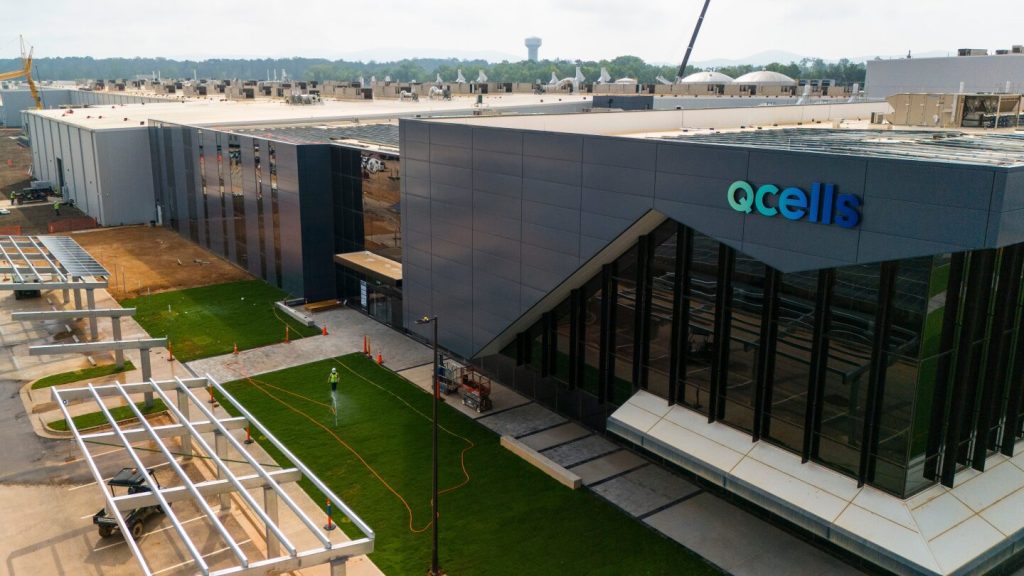Listen to the article
South Korean Solar Firm Qcells Reduces Operations as U.S. Customs Detains Imported Components
A major South Korean solar manufacturer has been forced to scale back operations at its Georgia facilities as U.S. customs officials detain critical imported components needed for solar panel production. Qcells announced Friday that approximately 1,000 of its 3,000 employees in Georgia will face temporary pay and working hour reductions, while an additional 300 staffing agency workers will be laid off from plants in Dalton and Cartersville.
The company’s manufacturing slowdown stems from U.S. Customs and Border Protection (CBP) detaining imported solar components at ports on suspicion they may contain materials produced with forced labor in China. These detentions have prevented Qcells from operating its solar panel assembly lines at full capacity.
“Although our supply chain operations are beginning to normalize, today we shared with our employees that HR actions must be taken to improve operational efficiency until production capacity returns to normal levels,” said Qcells spokesperson Marta Stoepker in a statement.
The detainments appear to be part of a broader enforcement initiative announced in August by Homeland Security Secretary Kristi Noem to strengthen compliance with the Uyghur Forced Labor Prevention Act. This 2021 law restricts Chinese goods made with forced labor from entering U.S. markets. According to reports, U.S. officials began detaining Qcells’ solar cells as early as June.
Qcells strongly denies using any materials or components produced with forced labor or sourced from China. Stoepker emphasized that the company maintains “robust supply chain due diligence measures” and “very detailed documentation,” which has already helped secure the release of some detained shipments.
“Our latest supply chain is sourced completely outside of China and our legacy supply chains contain no material from Xinjiang province based on third party audits and supplier guarantees,” Stoepker added.
The disruption comes at a challenging time for the U.S. solar industry, which is already navigating significant policy changes. Earlier this year, the Trump administration and Republican Congress dismantled most tax credits for solar panel purchases, creating market uncertainty for manufacturers.
Despite these challenges, Qcells appears committed to its long-term investment in American manufacturing. The company is proceeding with the completion of a $2.3 billion plant in Cartersville that will enable a more integrated domestic supply chain. This facility will process polysilicon refined in Washington state to produce ingots, wafers, and solar cells—critical components needed to manufacture finished solar modules.
The new production facility represents a strategic effort to reduce the company’s reliance on imported components that are vulnerable to supply chain disruptions and trade enforcement actions. When operational, the Cartersville plant would position Qcells to create a more resilient, end-to-end solar manufacturing presence in the United States.
Workers affected by the temporary reduction will maintain full benefits during their furloughs. The company noted that its Georgia employees earn an average annual salary of approximately $53,000.
Qcells remains optimistic about resuming full operations in the coming weeks and months as it continues to cooperate with customs officials to resolve the component detainment issues.
“Our commitment to building the entire solar supply chain in the United States remains,” Stoepker said. “We will soon be back on track with the full force of our Georgia team delivering American-made energy to communities around the country.”
The situation highlights the complex challenges facing renewable energy manufacturers as they navigate international trade regulations, supply chain vulnerabilities, and evolving domestic policies in an industry crucial to America’s energy transition.
Fact Checker
Verify the accuracy of this article using The Disinformation Commission analysis and real-time sources.




7 Comments
This situation highlights the challenges of building a domestic solar manufacturing base while also ensuring ethical sourcing of materials. Careful policy and collaboration between government and industry will be needed to balance these priorities.
The detainment of imported solar components is a complex issue with impacts on both labor practices and renewable energy production. I’m curious to learn more about the specifics of the U.S. government’s enforcement actions and how this will affect the Georgia solar plant’s operations long-term.
The solar industry is critical for the energy transition, so disruptions like this are concerning. I appreciate the company trying to minimize job losses, but hope the supply chain issues can be resolved quickly to avoid further impacts on production and workers.
This is a concerning situation for the solar industry. Forced labor allegations are serious, but disrupting critical component supplies could undermine clean energy efforts. I hope regulators and companies can find a balanced solution.
This is a challenging situation with no easy answers. The solar industry is crucial for climate action, but ethical sourcing of materials is also vital. I’m curious to see how this plays out and what lessons can be learned for building a sustainable, responsible renewable energy sector.
It’s unfortunate to see the Georgia solar plant workers facing pay and hour reductions due to these supply chain issues. Maintaining a stable workforce is crucial for the renewable energy industry to grow. I hope a resolution can be reached soon.
The U.S. government’s crackdown on potential forced labor in solar supply chains is understandable, but the impacts on domestic manufacturing are concerning. I hope a resolution can be reached that upholds labor rights without undermining renewable energy goals.